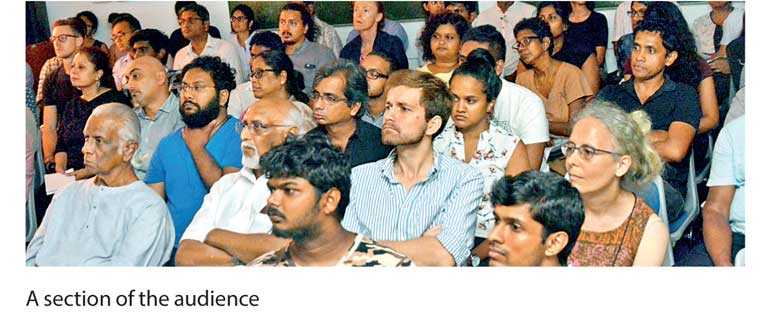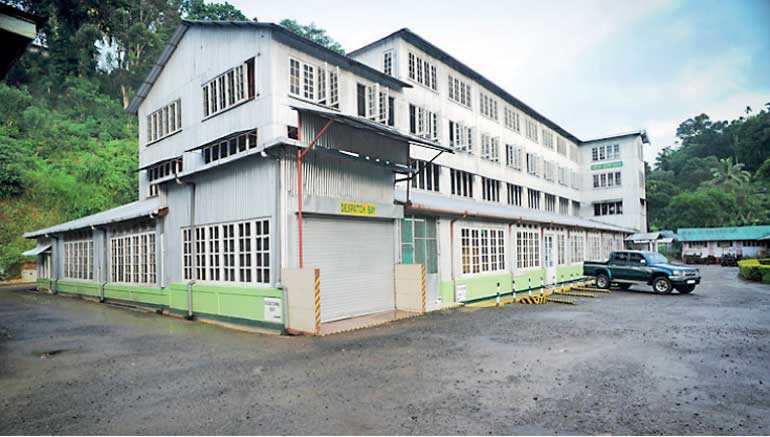Saturday Feb 21, 2026
Saturday Feb 21, 2026
Friday, 22 June 2018 00:00 - - {{hitsCtrl.values.hits}}

 By Shannon Jayawardena
By Shannon Jayawardena
If Sri Lanka’s urban development is to be truly sustainable, the livelihoods of deprived urban groups must be protected and supported, insisted University of Colombo Department of Sociology Professor Nishara Fernando.
“However this is not an easy task. The ones who plan and implement urban development projects have to overcome multiple challenges and obstacles such as lack of proper planning and the unnecessary and intrusive involvement of certain persons who expect a rapid and rationally unfathomable transformation of Colombo city within a short period of time,” stressed the Professor at the open forum held by the Centre for Poverty Analysis (CEPA).
The 58th forum themed ‘Neighbourhood Mapping’ as a means for an inclusive city shared insights on a research study carried out in Kompannaweediya also known as Slave Island with the Wekanda community.
Fernando also noted that the lack of complete implementation of development projects due to insufficient funds and lethargic staff who lack proper knowledge on executing social plans to secure the livelihoods of deprived groups and the lack of long-term monitoring and evaluation are few of the many crucial challenges that Sri Lanka is facing.
“Some of the urban development projects are currently heading towards becoming development disasters, forcing deprived groups to stay in the vicious cycle of deprivation, transferring this to the future generations as well,” he added. Addressing the major issue of slow urban development in the country, the forum highlighted the fact that urban infrastructure is widely seen as a key driver of economic growth and must be supported in relation to enhancing access to basic services to improve their quality of life.
USA Ball State University Department of Urban Planning Professor Nihal Perera said: “The endemic gap is a big issue but you can never import solutions. First we must look into the solutions and we need to re-think the way we look at not only the poor but also the ordinary people in our country.”
“There is a general idea that these people are illiterate, but there are people living there doing completely fine. We don’t have the tools and the imagination to even look at the city. Hence it is us who are really illiterate,” stressed the Professor.
He urged that poor people are also a part of the structure of economic growth within Sri Lanka and they shouldn’t be considered unnecessary or unwanted. They too must be included and we must get them involved if we are to build a sustainable urban development in the country.
Sharing findings from the research study, CEPA Researcher Nirmani Liyanage said: “The whole idea of the study was to introduce a method to understand and record everyday space making that happens in all livelihoods. We undertook this study last year while mapping everyday processors to engage more with the community.” The research was aimed at methodological innovations, sharing new knowledge on Asian cities, guiding local development projects and creating policy influence particularly in the local development in the long term.
Liyanage said: “There is a huge knowledge gap in Sri Lanka as there is no grounded knowledge on Asian cities. The Asian city is largely defined by the Western city. It is nothing wrong but we need to go beyond that. Very little attention is given to production of space by majority and we don’t have the tools to include people in planning here.” Although Wekanda has a an extreme pressure for development and is labelled as a slum and informal, the study proved that the city itself holds great potential with people who change with the city, adapting to the changes and creating new trends such as giving place to start-ups and small businesses.
“Wekanda is a beautiful city with space making at its best both physically and socio-economically. Even though it is known for having a history of struggle, the people have the capacity to instantly organise themselves around seeking solutions for common issues and threats and it is filled with creativity and resourcefulness,” emphasised Liyanage.
Pix by Upul Abayasekara
 The New Deniyaya Tea Factory, situated in Deniyaya in the Ruhuna region, achieved an all-time record price of Rs. 1,100 per kg for a low grown OP Grade at this week’s tea auctions.
The New Deniyaya Tea Factory, situated in Deniyaya in the Ruhuna region, achieved an all-time record price of Rs. 1,100 per kg for a low grown OP Grade at this week’s tea auctions.
This line of tea was purchased by Akbar Brothers Ltd. New Deniyaya Tea Factory is managed by Talawakelle Tea Estates Plc, certified for the Rain Forest Alliance and ISO 22000 – 2005 Food, Safety and Hygiene Management Standards. The factory operates under the supervision of Madura Gamage.
This record-breaking price was achieved by Forbes and Walker Tea Brokers Ltd. at the tea auction held on 20 June.